Why Does All Diner Corned Beef Hash Taste the Same
C ount this column as a victory for the common man, a two fingers up at the powers that be – an achievement akin to the scrapping of the proposed pasty tax. Not everyone at the Guardian was convinced I should sink my teeth into the humble corned beef hash, but hardly had I bulldozed the idea past them than, quite out of the blue, I received a plaintive tweet requesting that I "settle the mash v fried potatoes conflict once and for all". Thank you, Bjam! The cheque is in the post.
To be honest, I too was a late convert to the joys of this supremely satisfying dish. I can confidently say I didn't touch corned beef from the age of 13 until my mid-20s, a legacy of the teatime choices at school in my formative years. To say a corned beef roll was the lesser of the two evils can only be understood when you know that the only other choice was luncheon meat, Spam's less glamorous cousin. I'd had my fill for life – or so I thought, until an ex introduced me, kicking and screaming, to the corned beef hash. It was love at first bite. But how on earth do you work such magic on a tin of beef?
The beef
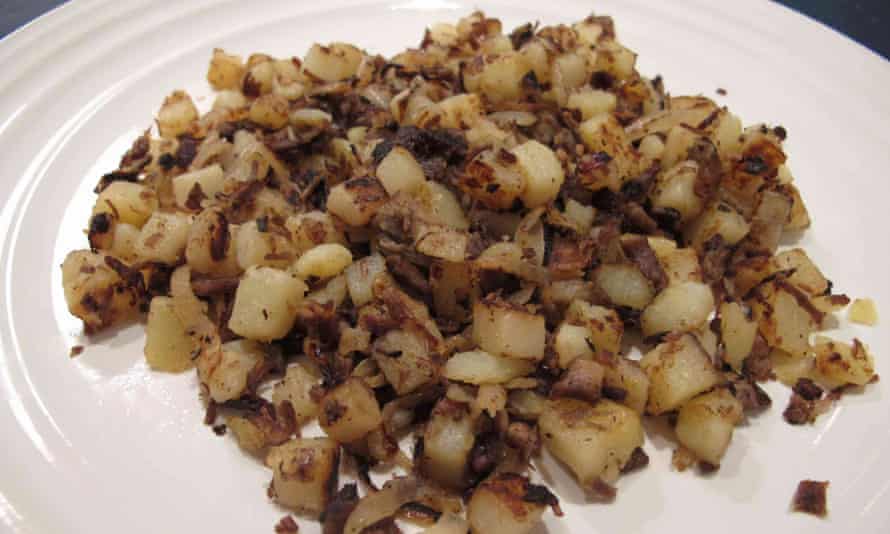
Staunch traditionalists may want to skip this paragraph and just assume that Prince's won out. But the thing is, though tinned corned beef is certainly the cheapest option, it's not the best. OK, a hash is a good way to turn the stuff from edible to surprisingly delicious, but in a side-by-side test with the British corned beef sold alongside other cured meats in a certain well-known supermarket, it didn't come off well. To be honest, it tasted rather fusty, of salt and fat rather than beef. (And if that's what you like, try, if possible, to check the sourcing before buying: tinned corned beef has been linked with several food scandals in recent years, from the horsemeat affair to the deforestation of the Amazon.)
Gary Rhodes goes one step further, and gives an excellent recipe for corned beef in his book The Complete Rhodes Around Britain. He writes that although "it's readily available for everyone, it's so good to eat it homemade". As he says, it is surprisingly simple: I buy a large piece of flank, soak it in brine for three days, then simmer until tender. A pig's trotter in the same pan supplies the gelatine needed to bind the meat together once chopped, and I then leave it to set overnight before slicing into corned beef that is distinctly juicier and beefier than its commercially made counterpart. Obviously this isn't feasible for a quick supper, but I'd highly recommend giving it a go if you have the time and resources. A warning: because it hasn't been compressed into a tin, my homemade stuff melts in the pan, lubricating the other ingredients with its jelly and leaving strands of delicious salty beef, which crisp up gratifyingly in the heat. I prefer this to the neat little cubes suggested in recipes such as Delia Smith's, but others may not.
The vegetables
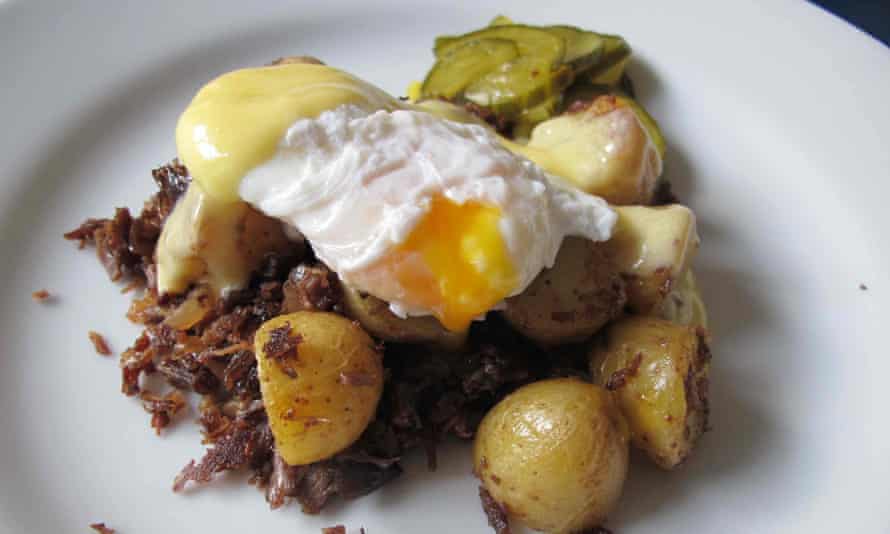
Onions are a must – the only recipe I try that omits them is the salt beef hash dish I've adapted from Dan Doherty's Duck and Waffle cookbook, which uses confit shallots instead. Delicious, but far too fancy for such a simple dish at home. I like the onions thinly sliced, as Rhodes and Delia Smith suggest, rather than chopped, so they don't get lost, and slightly caramelised to add sweetness, rather than simply softened.
Potatoes are the other mandatory ingredient. Smith clues me into the fact there are two corned beef hashes divided by a common language when she writes: "I love New York and, in particular, New York delis, where I always order a hot pastrami sandwich on rye bread and my husband always orders corned beef hash with a fried egg. Although we don't have the same type of corned beef here, our humble, modest tinned version makes a mean old hash." I realise that what she, Doherty and Rhodes are making is what Rhodes indeed describes as "an American corned beef hash", where all the ingredients are fried hard until crisp, a treatment that demands a robust, waxy potato such Doherty's new variety, or Smith's desiree or king edward.
Very lovely they are too, but the corned beef hash I'm used to has a softer, wetter texture, and is better made with a floury variety. I'd stop short of the mash suggested by Tom Norrington-Davies in his book Just Like Mother Used to Make, unless you've got some you need to dispose of. Adding it in chunks gives the hash a more interesting texture, especially if you leave the skin on, as Smith suggests.
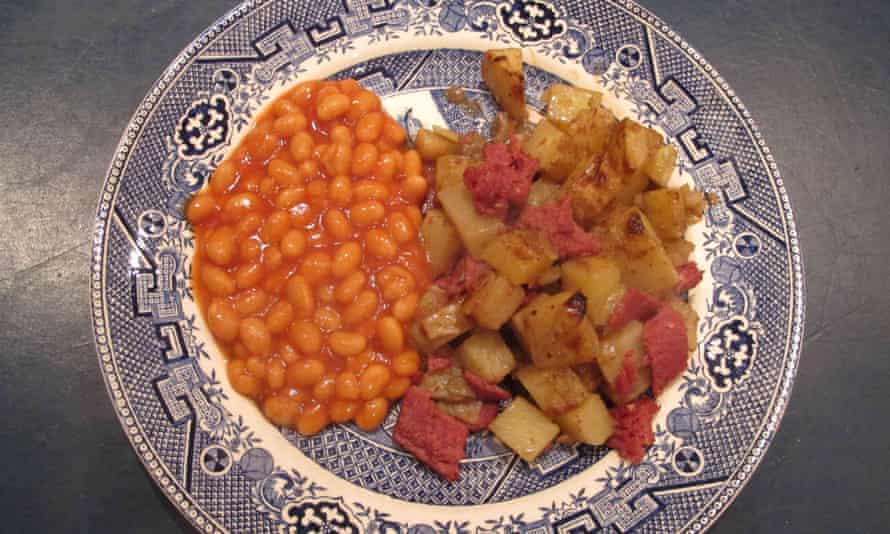
One of the best tips I get is from a lovely little book of recipes published in tribute to my dog trainer's nanna Sheila, which includes a facsimile of the recipe in question, "real Newcastle comfort food", written out by the lady herself. Instead of precooking the potatoes, as everyone else suggests, Sheila adds them to the pan raw, then simmers them in beef stock until tender. It is a brilliant idea – they absorb the stock to become deliciously rich and wonderfully beefy. Sheila, I take my woolly hat off to you.
Norrington-Davies adds tinned tomatoes and peas to his dish, explaining that the latter was "a peculiarity of my father's … the sweetness cuts through the saltiness of this meat very nicely". I like both additions, the tomatoes bringing a little fruity acidity and the peas, as he says, balancing the savoury meat, but the tomatoes turn it into another dish entirely. The peas, though welcome, are certainly not necessary for a decent hash, but if, like me, you'd like to introduce a green element, I'd recommend chucking in a handful.
Seasoning and additions
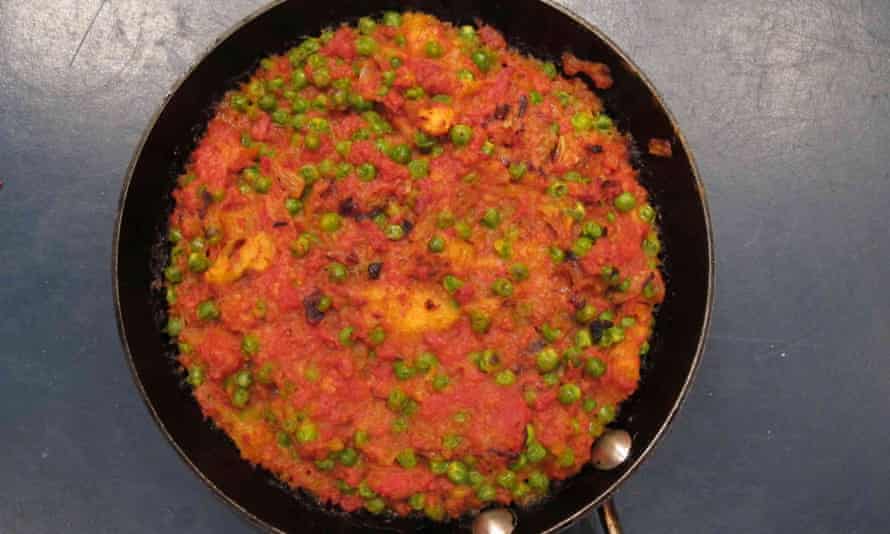
Smith marinates her corned beef chunks in a piquant mixture of wholegrain mustard and Worcestershire sauce, both of which make an excellent counterpoint to the bland potato and fatty meat. Norrington-Davies's Tabasco is another fine addition if you'd like a touch of spice – I often slosh it on the side. Doherty serves his hash with gherkins (which again cut through the fattiness nicely), and he and Smith top their hashes with a fried egg, with Doherty adding his customary dollop of hollandaise.
There is no arguing with the fact that the latter two items improve almost everything they touch, but I'd save the hollandaise for a special corned beef hash occasion, and the egg for those moments when you're really, really hungry. Strictly speaking, the dish needs neither, though the egg yolk does supply a certain pleasingly gooey richness. That said, Norrington-Davies and Doherty perspicaciously observe that corned beef hash makes an excellent brunch dish (well, Doherty writes that it's "the kind of food we have found people tend to look for around the 4am mark, but it also works as a post-sleep cure"), which may be the time when you start to cast around for the eggs and butter. Sheila serves hers with baked beans – a classic presentation.
Cooking
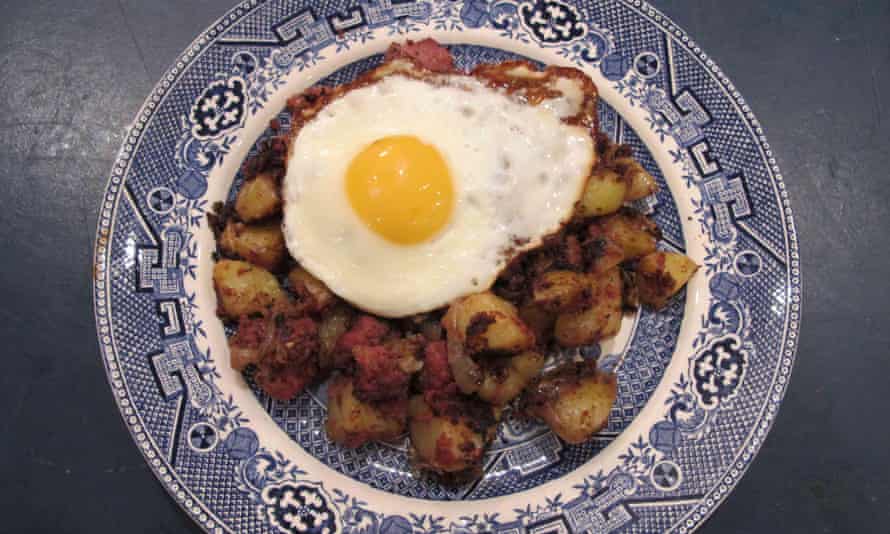
Sheila, Doherty and Norrington-Davies all finish their dishes off in the oven or under the grill, giving them a deliciously crisp, golden top. This gives a lovely contrast, in Sheila's case, with the juicy, tender potatoes beneath, and is well worth an extra five minutes' wait. Use this time to ready the ketchup.
(Serves 2)
Generous knob of butter
1 large onion, finely sliced
1 large (about 275-300g) floury potato, such as maris piper, unpeeled but cut into 1cm chunks
350ml hot beef stock
200g corned beef, cut into 1cm chunks
100g peas (optional)
1 tbsp grain mustard (or to taste)
1 tbsp Worcestershire sauce (or to taste)
2 eggs (optional)
Melt the butter in a frying pan over a medium-high heat. Fry the onion, stirring frequently, until golden, then add the potatoes. Stir to coat with butter, cook for a minute or so, then pour in the stock. Simmer for about 15-20 minutes until the potatoes are really tender and the stock has almost evaporated, adding more hot water if necessary.
Heat the grill. Stir in the corned beef, peas, mustard and Worcestershire sauce. Turn up the heat and cook, stirring occasionally, for about five minutes, until they're heated through. Put the pan under the grill for about five minutes until the top is crisp and golden.
Meanwhile, if you're topping the dish with eggs, heat a small frying pan, add a little more butter and fry the eggs to your liking. Serve on top of the hash.
Corned beef hash: best of British or the worst school-dinner stodge? Would you defend tinned corned beef to the death, or are you tempted to make your own? And are there any other family favourites you'd like me to tackle?
Source: https://www.theguardian.com/lifeandstyle/wordofmouth/2015/feb/05/how-to-cook-perfect-corned-beef-hash-recipe
0 Response to "Why Does All Diner Corned Beef Hash Taste the Same"
Post a Comment